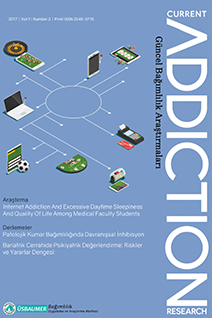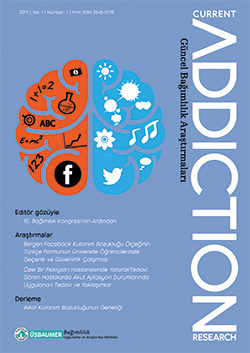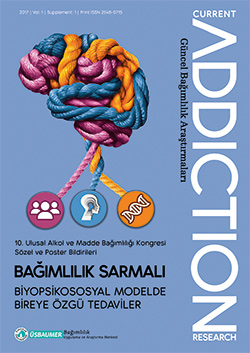Original Article
Başak Ünübol,Gizem Akülker,Berhudan Şamar,Kursad Nuri Baydili,Selim Arpacıoğlu
2025, 9(1), s:35-42
İntroduction: Research has identified many characteristics that may influence women's progression from use to addiction and their struggle with recovery. In previous studies, it was reported that 2.9-3.2% of the applicants to addiction treatment centers in Turkiye were women. Considering the low rate of women applying to treatment compared to men, it was thought that examining the completion of treatment would make an essential contribution to the literature. At the same time, there is no recent study on the descriptive characteristics of women in inpatient addiction treatment centers in our country and the factors affecting treatment completion.
Method: Our study was conducted by examining the data of 104 female patients who were treated as inpatients with a diagnosis of alcohol or substance use disorder according to DSM-5 in an Addiction Detox Clinic of a Mental Health Hospital. During inpatient treatment, withdrawal severity is assessed according to the type of substance, and the necessary detoxification medication is administered according to the CIWA-R or COWS scales. All participants completed the Addiction Profile Index (API) scale. The data were analyzed using the SPSS-27 package program. Frequency tables for sociodemographic questions were created. Regression analysis was applied to see the effect of the independent variable on the dependent variable. The analyses were applied with alpha level = 0.05.
Results: The mean age of the participants was 31.5 years, the primary substance of use at the time of admission to treatment was alcohol at 45% and substance at 55%, and the frequency of use was every day at 93%. Having a family history of alcohol or substance abuse was 49%. 47% were single, judicial history was 37%, 73% were unemployed, 59% had a history of comorbid mental illness, 35% had a history of suicide attempts in the past, 54% of the participants had multiple substance use, and 22% had a history of intravenous substance use, even if only once in their lives. The early discharge rate was 38%, and sociodemographic and clinical variables were not statistically significant. It was observed that the API scale was statistically highly correlated with non-completion of treatment, especially in individuals with high 'severe craving' sub-dimension scores.
Conclusion: Considering that women have a low rate of applying for addiction treatment, it is important to understand the needs of women patients who apply for treatment to complete the treatment and to include gender-specific intervention programs in the treatment.
Review Article
Abdullah TÜRKMEN
2025, 9(1), s:23-34
In recent years, addiction research has emphasized that substance use behavior should not be understood solely through biological mechanisms, but rather through multidimensional frameworks that include psychosocial and cultural variables. The aim of this review study is to comparatively examine the impact of addiction theories on Turkish individuals living in Turkey and Europe, with attention to their sociocultural contexts. The study was designed as a qualitative meta-analysis, and a systematic review of publications from 2010 to 2025 was conducted using databases including ULAKBİM, DergiPark, Scopus, and Web of Science. Selected studies were analyzed through theoretical frameworks such as Cognitive Behavioral Therapy (CBT), Social Learning Theory (SLT), psychodynamic, and biological models. Thematic analysis indicated that addiction in Turkey is primarily shaped by cultural norms and social learning processes, whereas Turkish immigrants in Europe are more affected by factors like discrimination, language barriers, and identity conflicts. Group therapy and culturally adapted interventions have been found to offer sensitive and effective responses to these challenges. The findings underscore the necessity of developing culturally sensitive clinical models that integrate dynamics of identity, belonging, and social exclusion.
Original Article
Self-Efficacy Against Substance Abuse Risk: A Study on Vocational School Students
Özge Kutlu,Dilan Erkan,Sevinç Sütlü
2025, 9(1), s:15-22
Objective: Although substance addiction is a significant problem that is widespread among young people and threatens public health, it is seen that the protective factors related to the issue have not been examined sufficiently. This study aimed to determine the self-efficacy of vocational school students regarding protection from substance addiction and related factors.
Method: The research is a descriptive and cross-sectional study. The research was conducted with 506 students studying at a vocational school. In line with the purpose of the research, “Personal Information Form” and “Substance Addiction Protection Self-Efficacy Scale” were used as data collection tools. Frequency distribution and variance analysis were used in the analysis of the data.
Results: 77.5% of the 506 participants who participated in the research were female and 22.5% were male. A statistically significant relationship was found between the participants’ self-efficacy regarding protection from substance addiction and the variables of gender, age, program of study and place of residence (p<0.005).
Conclusion: In order to increase the self-efficacy of vocational school students in protecting themselves from substance addiction, a course on combating addiction should be added to the curriculum, structured early intervention programs should be developed, and student communities and social support mechanisms should be strengthened.
Original Article
Azize TÜRKOĞLU,Cemal Onur NOYAN
2025, 9(1), s:5-14
Objective: The aim of this study is to examine the relationship between exam anxiety levels and smartphone addiction levels of secondary school students.
Method: This study was designed using the relational survey model from quantitative methods. The population of the study consists of students studying at the secondary school level in Istanbul between 2023-2024. The sample of the study consists of 417 students selected by simple random sampling method. In the study, Personal Information Form was used to evaluate demographic characteristics, ‘Westside Test Anxiety Scale’ was used to measure the level of test anxiety and ‘Smartphone Addiction Scale-Short Form’ was used to measure the level of smartphone addiction. The research data were analysed using SPSS 27.00 package programme.
Findings: It was determined that there was a positive, weak-medium significant relationship between test anxiety levels of secondary school students and smartphone addiction. In addition, it was determined that there was a significant relationship between test anxiety level and gender, parental attitude, school achievement, parents' attitude towards success, and duration of smartphone use. It was determined that there is a significant relationship between smartphone addiction and time alone, duration of smartphone use, school achievement, parents' attitude towards success.
Conclusion: There is a significant relationship between test anxiety and smartphone addiction in adolescent secondary school students. This indicates that there is a need for prevention studies and psychoeducation for students, teachers and parents in secondary schools for test anxiety and smartphone addiction.
Review Article
A holistic review of fentanyl use and its impact on public health
ALEJANDRO BORREGO-RUIZ
2024, 8(2), s:23-33
Fentanyl is a synthetic opioid that was engineered to provide a potent analgesic effect, with its medical utility widely established in clinical contexts such as pain management and anesthesia. Fentanyl use has become a critical public health issue due to diversion for misuse and to rapidly proliferation of illicit manufacturing. This persistent increase in illicitly manufactured fentanyl distribution shows no indication of decline, raising significant concerns regarding its impact on public health and opioid misuse trends, including a dramatic increase in overdose deaths. Moreover, individuals from socially or economically precarious backgrounds, as well as those suffering from mental health disorders, are particularly vulnerable, as limited access to resources and support systems can lead to increased substance use as a coping mechanism for stress and adversity. Therefore, the objective of this narrative review is to provide a holistic overview on fentanyl, addressing its synthesis process, pharmacology and clinical use, relationship with gut microbiome, epidemiology and global distribution, patterns of use and motivations, and overdose treatment. For this purpose, current and relevant evidence on fentanyl and its correlates has been conscientiously assessed and outlined.
Original Article
Bibliometric Analysis of Theses Conducted about Alcohol Use Disorder in Turkey
HATİCE OKSAL,ÖMER BÜBER,HANDE TUĞÇE DEMİRCİ
2024, 8(2), s:14-22
Objective: Alcohol use disorder is a common public health issue that negatively affects an individual's quality of life, as well as their physical, psychological, and social well-being. The aim of the study was to conduct a bibliometric analysis of postgraduate studies on alcohol use disorder in Turkey between the years 2008-2024. Method: This study is a descriptive scanning research conducted using bibliometric analysis methods. Searches were conducted separately in the National Thesis Center database using the keywords "alcohol use disorder," "alcohol dependence," "alcoholism," and "alcohol abuse." The inclusion criteria were determined as the theses being open access and including human samples. Based on these criteria, a total of 200 theses constituted the sample for the analysis. Findings: In the study, it was determined that the theses on alcohol use disorder were mostly master's level, quantitative and cross-sectional. It was determined that the highest number of theses were published in Ege University, and the departments that studied the subject the most were psychiatry, psychology and nursing. The most frequently used scale in the theses was found to be the Michigan Alcohol Screening Scale. Conclusion: The data obtained are largely in line with the studies in the literature. Using longitudinal and qualitative methods together in theses can provide more detailed information about alcohol use disorder. In future research, it may be useful for different disciplines to work together in order to provide innovative solutions to problems.
Original Article
Strengthening the Awareness Levels of University Students Regarding Substance Use
AYŞEGÜL DUMAN,HİLAL ÇERKEZOĞLU,SALİH GÜLEN
2024, 8(2), s:10-13
The widespread use of substances in society requires various precautions to be taken and our youth to be made aware of this issue. It is important to educate young people (18-25 age group) who start university on these issues and to determine their substance use awareness levels and train them if necessary. For these reasons, the aim of the research is to strengthen the substance use awareness levels of university students. In this context, the research, which was conducted with a pre-posttest experimental and control group experimental design, lasted six weeks. The data collected using the Determination of Awareness Levels of University Students Towards Substance Use Scale was analyzed by applying T-test with the help of SPSS package program. According to the obtained data; it can be said that the “Addiction Awareness Program” implemented to strengthen the awareness levels of university students towards substance use produced positive results on the experimental group. It is recommended that programs that strengthen substance abuse awareness, such as addiction awareness programs, be provided to young people.
Review Article
Substance Addiction In Adolescents And The Role Of The Family: A Mini Review
ÖZKAN EZGİ,KARABURUN MERVE,KABA AYŞE,DURMUŞ ELİF,EMLU HAKAN,KABA FATİH,FİDAN ENİSE KÜBRA
2024, 8(2), s:5-9
Substance addiction is one of the important problems threatening society today. Although it causes negative consequences in the person's life, it makes the process more dangerous as the person develops tolerance and desires the substance more. Adolescence is considered a risky period in substance addiction, where psychological, sociocultural and genetic factors play a role, and many factors such as the biological, psychological and environmental conditions of the adolescent determine the development processes of substance addiction. At this point, the family plays a role in the child's social and cognitive development and is seen as an important factor in the process of developing substance addiction. Lack of family functionality can lead to aggression and anti-social behavior disorder, and as a result, delinquency and substance use behaviors may occur in the adolescent. In this study, the role of the family in adolescents' development of substance addiction will be discussed.
Original Article
The Turkish Adaptation, Validity And Reliability Study Of The Beliefs About Thirdhand Smoke Scale
Tuğba Yılmaz,Zühal Albayrak,Tijen Acar
2024, 8(1), s:45-51
Objective: Thirdhand smoke is an important public health problem. The aim of this study is to adapt the ‘‘Beliefs About ThirdHand Smoke’’ scale developed by Haardorfer et al to Turkish, to examine its validity and reliability.
Method: This methodological study was conducted in Ankara between 01.05-29.6.2021. Turkish version of the original scale “Beliefs About ThirdHand Smoke Scale’’ was obtained firstly. For the scale validity and reliability analyzes were performed: For content validity expert views were received, for construct validity confirmatory factor analysis; for reliability internal consistency, intra-class correlation were performed. Voluntary 256 adults who applied to polyclinics of Kecioren Training and Research Hospital, spoke Turkish, communicated, smoked or living at least one person who smoked, “socyodemographic features form” and Turkish version of the original scale “Beliefs About Third Hand Smoke Scale’’ was applied face to face. The data analysis used IBM SPSS 24.0 and AMOS 21.
Results: Turkish adaptation of the original scale “Beliefs About Third Hand Smoke Scale’’ is 9 items, 2 factors. The content validity index for all items Turkish version of the original scale “Beliefs About Thirdhand Smoke Scale’’ is ≥0.80; there is inter-expert fit. Cronbach's alpha values overall/factors are 0.910/0.849, 0.835 respectively; scale is high reliable, factors are acceptably reliable. Item-total correlation is 0.580-0.794; each item is acceptably distinctive, should remain at scale. Intra-class correlation, inter-items correlation matrix r values are 0.376-0.771; items are related intermediately, internally consistent. Confirmatory factor analysis goodness-of-fit values, CMIN/df=3,1, RMSEA=0,091, RMR=0,054, GFI=0,946, AGFI=0,889, NFI=0,953, CFI=0,967; two-factor structure of the scale well-fitting to the data was confirmed.
Conclusion: Turkish adaptation of the original scale developed by Haardorfer et al in 2017 “Beliefs About Thirdhand Smoke Scale’’ is a reliable and valid measurement tool.
Turkish version of the original scale “Beliefs About Thirdhand Smoke Scale’’ can applied in studies and trainings, increase awareness of the thirdhand smoke and guide the fight against tobacco.
Original Article
İrem Teke Bulut,Ceylan Ergül Arslan
2024, 8(1), s:34-44
Objective: In this study, it was aimed to Decipher the relationship between the emotion regulation difficulty levels and psychological well-being levels of individuals who use tobacco.
Method: The study group of this study was composed of people between the ages of 18-65 Dec. The research data were collected by reaching 212 people virtually through a survey. The data were sent to the participants online with the ‘Sociodemographic Information Form’ prepared by the researcher, the ‘Emotion Regulation Difficulty Scale’ (DERS) and the ‘Psychological Well-Being Scale’ (PWB) scales and they were asked to answer and the answers were evaluated and collected.
Results: Within the scope of the study, the data of 212 participants who smoked were examined. The sociodemographic variables of the participants were compared with their emotion regulation difficulties and psychological well-being levels. In addition, the relationship between emotion regulation difficulties and psychological well-being levels of smokers was examined. According to the findings obtained in the study, significant differences were found in the scores of psychological well-being and difficulties in emotion regulation in terms of gender, marital status, employment status, income level, psychological disorder, presence of a smoker in the family, reason for smoking.
Conclusion: In addition, a negative, moderate and significant relationship was found between psychological well-being and difficulty in regulating emotion in smokers. The total score of emotion regulation difficulty predicts psychological well-being scores negatively and significantly. The model explains the variance by 14%. According to the findings regarding the prediction of psychological well-being scores by sub-dimensions of emotion regulation difficulties, it was found that difficulty scores in developing emotion regulation strategies predicted psychological well-being scores negatively and significantly. The model explains the variance at a rate of 16%.



 2. Sayı
2. Sayı
 1. Sayı
1. Sayı
 Ek Sayı
Ek Sayı







